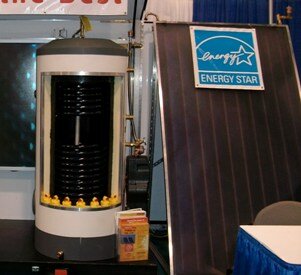Why Go Solar in Arizona?
Top 10 Reasons to Go Solar in Arizona
Create an Energy Efficient Solar Home
Host a Solar Town Hall Meeting
Arizona Energy Stimulus Funding
| Free Solar Newsletter |
5 Steps to Create an Energy Efficient Solar Home in AZ
Step 1: Energy Efficiency
Step 2: Solar Thermal Hot Water
Step 3: Zero Out with Solar Power
Step 4: Call a Solar Installer for a Free Quote
Step 5: Research Solar Products
What Solar Incentives Are Available in Arizona?
How Much Do Solar Incentives Pay?
Utility Solar Rebate Programs
Arizona Solar Incentives
Federal Solar Tax Credits
Want to Go Solar in Your Community?
Conduct a Solar Community Outreach Event
Become an Arizona Solar Advocate!
Arizona Solar Watchdog Program
AZCC Public Policy:
Arizona Renewable Energy Standard
Approved: Arizona Net Metering
Real World Installation Videos
Main Solar Video Channel
Energy Efficiency
Radiant Barriers

Arizona Energy
Efficiency TV Channel
Arizona Solar
Hot Water Heaters

Arizona Solar
Water TV Channel
Arizona Solar Power
Photovoltaic (PV)

Arizona Solar
Power TV Channel
2nd Step: Installing
Cost-Effective Solar Thermal Water Heaters

Click here to find an Solar Installation Company
The second step in building an energy efficient solar home is to examine how much money you would save by replacing your conventional electric or gas water heater with a solar hot water heating system. (Google: DOE Energy Calculator)
Research shows that an average household with an electric water heater spends about 25% of its home energy costs on heating water. A much more cost effective way to heat water is to put a solar collector panel on the roof and use the sun's solar energy, which is free, to heat your water supply. Click here to see how much a solar hot water heater would save you or search Google for the "DOE Energy Calculator".
Right now incentives programs will pay up to 75% of a solar water heating system's cost and installation. Most solar hot water installation companies state that solar water heaters can typically reduce the cost of heating water by as much as 80%. With that said, most systems will consume a little energy because they are still connected to the utility gas or electricity supply as a backup measure.
With out-of-pocket costs ranging from $750 to $1,500 after incentives and rebates, solar water heaters can pay for themselves in a matter of two to four years, depending on the size of the family's water usage and yearly utility rate increases. That is why the time to act is now before incentives evaporate.
More important than the financial reward is the societal benefit of reducing carbon emissions. Using the sun's rays to heat water instead of burning fossil fuel is one of the most cost-effective ways to reduce carbon emissions that contribute to global warming.
There are two types of active solar water heating systems:
- Direct circulation systems - Pumps that circulate household water through the collectors and into the home. They work well in climates where it rarely freezes.
- Indirect circulation systems - Pumps that circulate a non-freezing, heat-transfer fluid through the collectors and a heat exchanger. This heats the water that then flows into the home. They are popular in climates prone to freezing temperatures.
Surprising as it may seem, analysts believe that an average residential water heater produces twice as much carbon emissions than an average car. Another way of looking at it is that if all households used solar water heaters, the reduction in CO2 emissions would be the same as doubling the fuel-efficiency of all cars.
Let us make Arizona a better place to breathe and significantly reduce the number of high ozone alert days! Pick up the phone right now and call several installation companies listed in the Arizona Solar Handbook, Buyer's Guide and Business Directory to get a free quote!
5 Steps to Create an Energy Efficient Solar Home in Arizona
Step 1: Energy Efficiency
Step 2: Solar Thermal Hot Water
Step 3: Zero Out with Solar Power
Step 4: Call a Solar Installation Company for a Free Quote
Step 5: Research Solar Products|
Want a free solar quote? Click on the advertising banners:
 Residential Solar Panels for sale - A1 SolarStore
Solar panels for home
Residential Solar Panels for sale - A1 SolarStore
Solar panels for home
|

